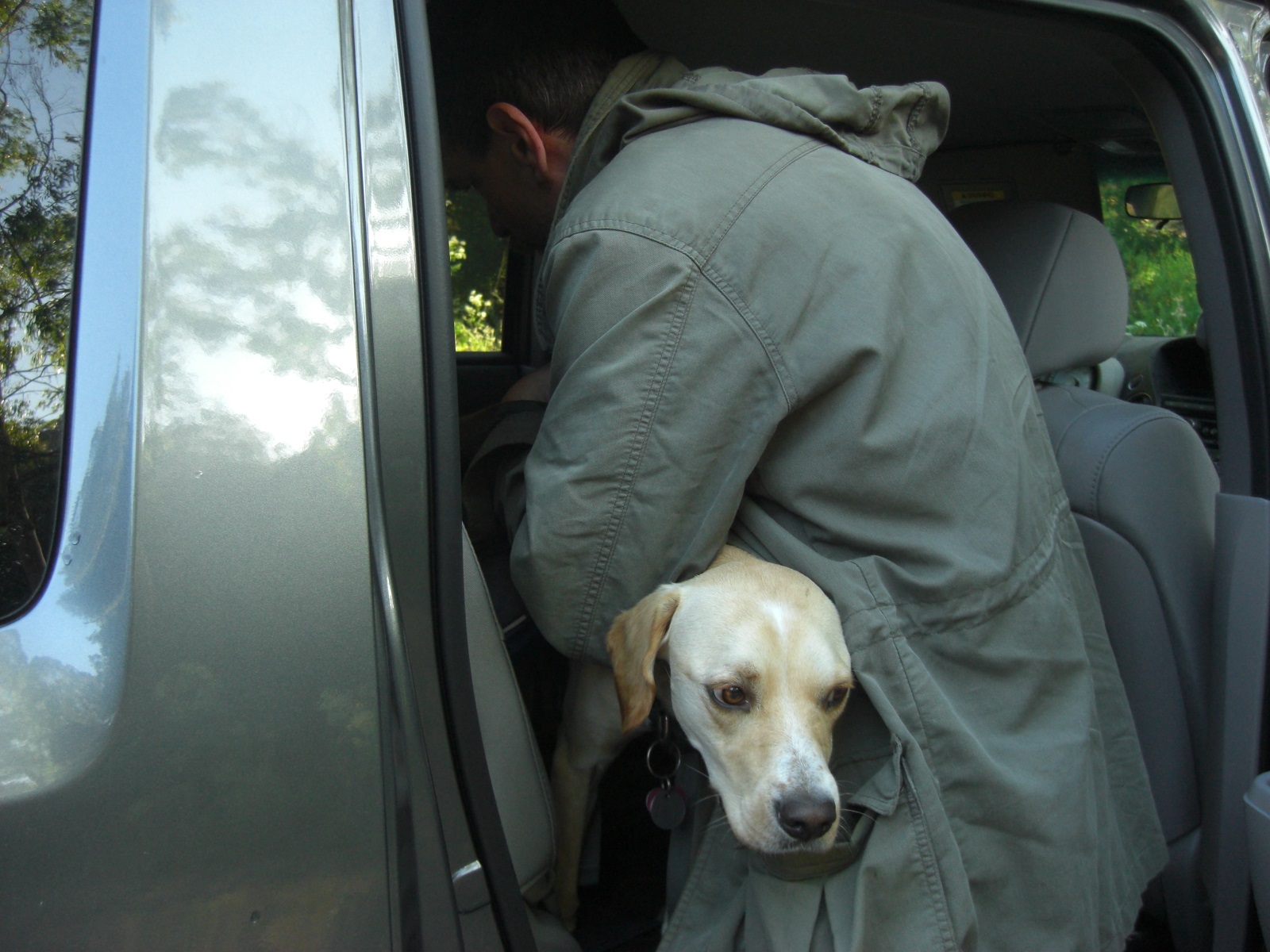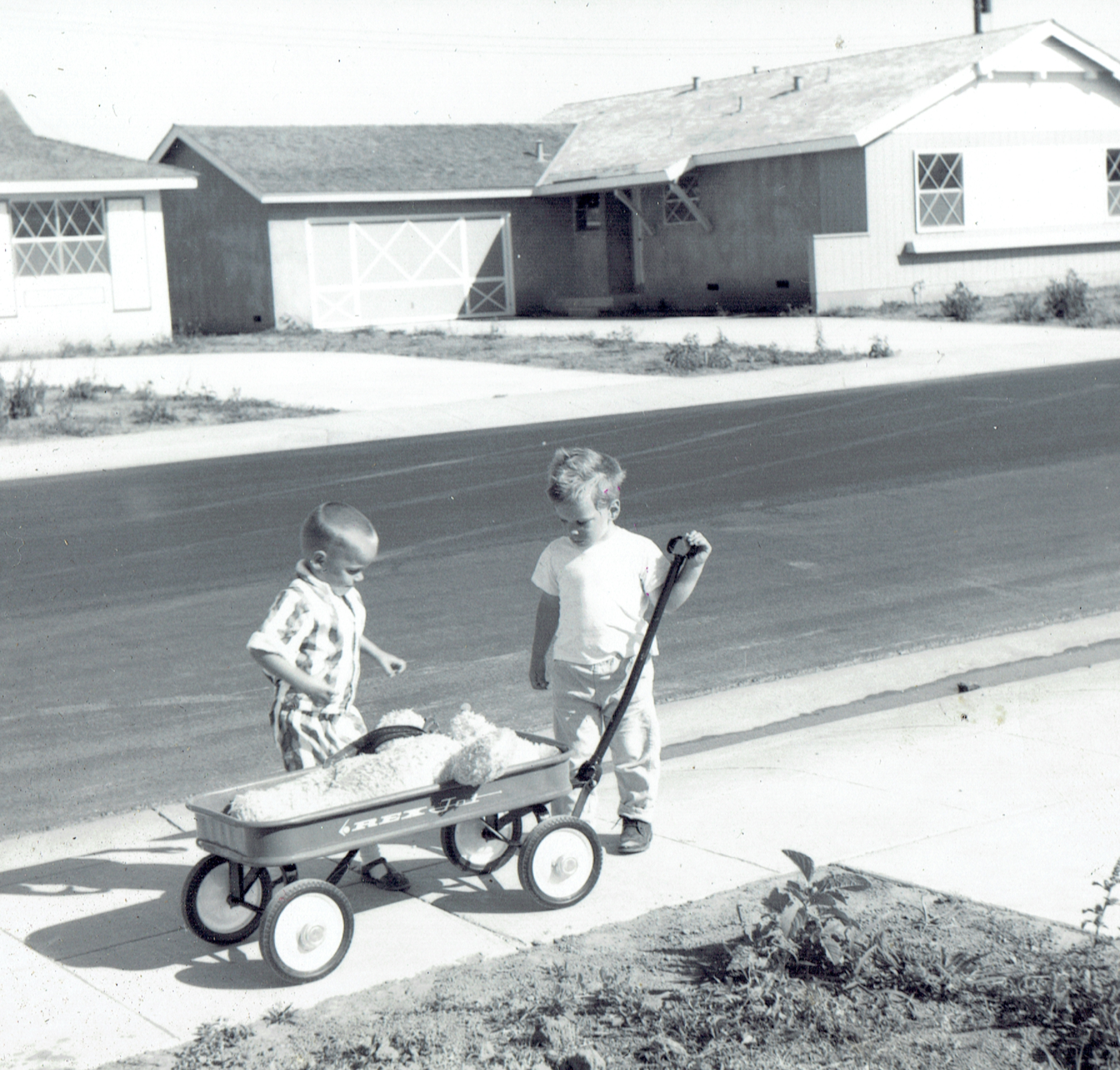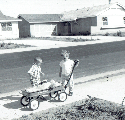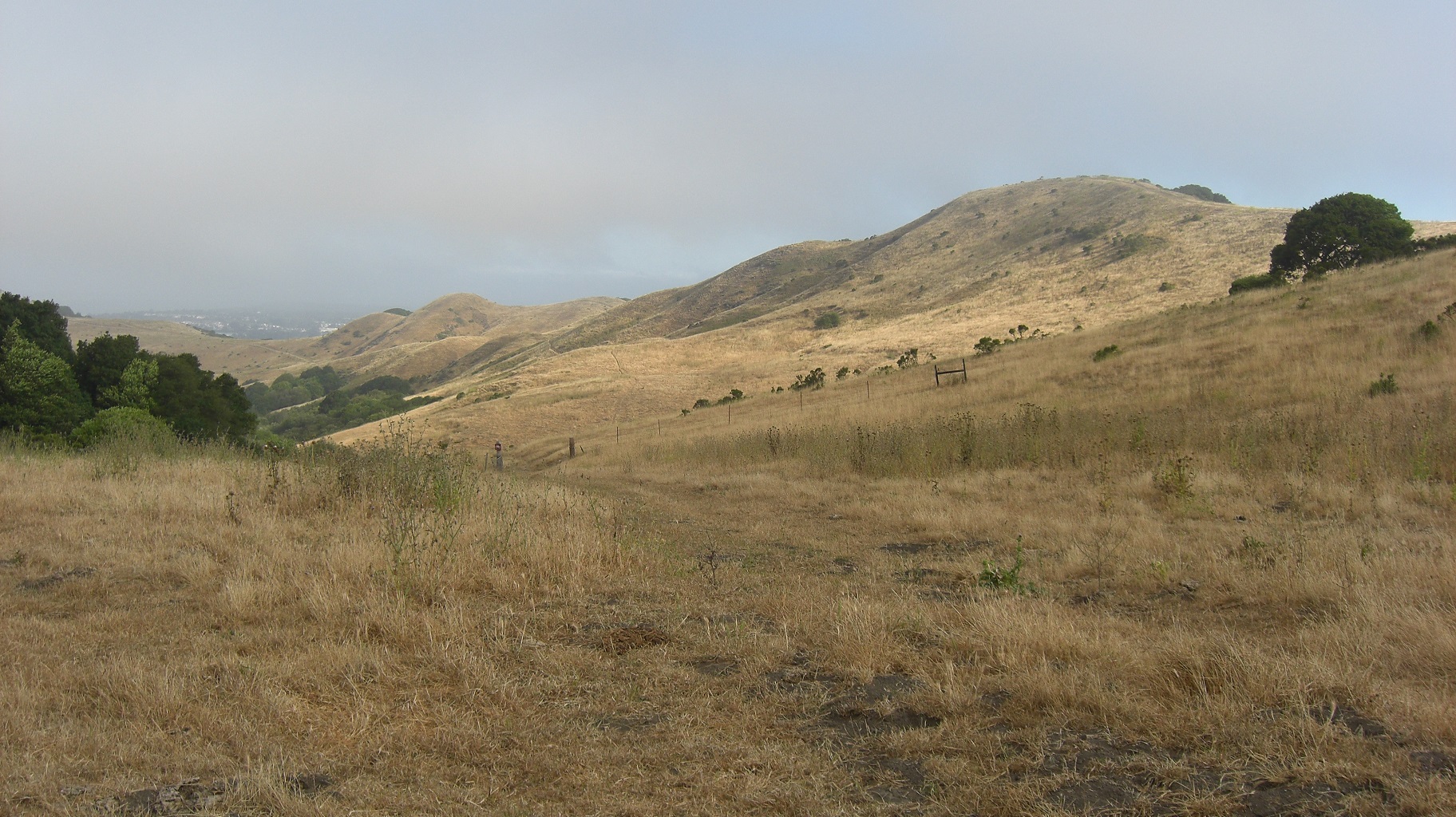Reflections on the known universe… The Old Guy with the Dog
by Kurt True

my dog

| my dog |
Whatever became of Army/Navy surplus stores? When I was a kid, you'd see them all over the place. Your mom would be driving down that road with the KMart and the fast food joints and the motels, and you'd see a plywood sign as tall as the local zoning laws permitted, and the sign said this: "Army/Navy Surplus Tents Boots Camping Supplies Dungarees."
Where did all those places go? Maybe you buy that stuff online these days. Or maybe modern information technology has enabled defense contractors to implement manufacturing practices that do not result in surpluses large enough to support a major segment of the retail sector.
But that's a question for another day.
The important thing is, when I was a youngster, that's where your camping supplies came from, the Army/Navy surplus store. There and Sears. We didn't have these fancy camping stores with the dome tents and the artisan trail mix. Nobody heard of trail mix. If you were the kind of kid who got hungry on the trail, you'd carry a bologna sandwich in your pocket. Or toast. Something your mom could wrap up in wax paper for you.
No, that's not the important thing either. I'm getting to the important thing.

John (L), Kurt (R), Santa Clara, 1964

| John (L), Kurt (R), Santa Clara, 1964 |
Now, my friend John and I met the year before we started kindergarten. Our families moved to Santa Clara right around the same time, and we lived two doors away from one another. Mr. and Mrs. Evans lived in the house between my house and John's house. Mr. and Mrs. Evans were an older couple with twelve Siamese cats.
John's family, and my family, and Mr. and Mrs. Evans lived on Coolidge Drive, which together with Hoover Drive formed a cul de sac lined with immaculate sidewalks and ranch style homes. It was a pretty typical suburban neighborhood once you averaged out all the cats.
I think I was about eleven years old when I saw a black and white movie about these two guys who grew up together, and I don't remember now if they were brothers, or friends like John and me, but that doesn't matter.
What matters is, when I saw this movie, in the very first scene of the movie, the opening scene, these two guys in the movie were about the same age as I was at the time, about eleven-or-so. And these two eleven-or-so-year-old boys in the movie were playing a game of their own invention, a game based on Viking funeral customs.
And here's how you play the Viking funeral game: First, you go outside and build a fire. Then you place a toy soldier horizontally on a toy boat. Then you float the toy boat out on a pond. You use your fire to ignite some arrows, and then you shoot the flaming arrows at the boat, the object of the game being to set the toy boat and the toy soldier on fire with the flaming arrows.
According to this movie, that's how a Viking funeral works. Except you use a real boat, naturally. And a real soldier. A Viking soldier. A dead one. Naturally. You put your dead Viking on the boat, and then you set the boat adrift, and you shoot flaming arrows at the boat.
I think it's about ten minutes into the movie when the boys vow that whichever boy dies first gets a Viking funeral, the responsibility for the undertaking of which will fall to the survivor. And these boys in the movie grow to adulthood, and one of them decides to join the French Foreign Legion, and the other one says "Well, I guess I'm going to have to join the French Foreign Legion too then." And then there's a lot of oppressive heat, unsanitary conditions, stark landscapes, stealthy adversaries, disillusionment, and maybe a love interest.
Those Foreign Legion movies tended to follow a formula.
Of course, I saw this movie in an era long before cable TV and VCRs and Netflix and all of that. This was back in the days when the local TV stations would show movies during the day, and they'd try to generate interest in the movie by offering prizes.
Pat McCormick hosted a show on Channel 2 where he'd tell you the Count and the Amount before the movie started and at each commercial break, and then he'd call random phone numbers from out of the phone book.
If Pat called your number, and you knew the Count and the Amount, you'd win the Amount, fifty bucks or maybe a hundred or two-hundred. I think the Amount went up by ten dollars after each commercial break until somebody won the money, and then the Amount went back to fifty bucks.
I have only the vaguest recollection of how the Count worked. I think the Count incremented by one if the person on the phone didn't know the Count and the Amount, but if the person on the phone knew the Count and the Amount and won the money, then the Count went back to zero.
"Dialing for Dollars," the show was called. It's in a Janis Joplin song.
So I don't remember if it was "Dialing for Dollars" or "Pippa and the Prize Movie" or one of the other local giveaway shows that showed this black and white Foreign Legion movie, but when I saw it, I felt like I was watching a movie about John and me. We were just like these two guys in the movie, filled with an abiding sense of purpose and destiny that pulled us in directions that tended to bring grave risk to lives, property and, on one or two occasions that I recall with sincerest remorse, international relations.
United as we were by our shared interests and extraordinary worldview, John and I spent just about every waking hour of our lives together, and after a while I suppose I began to represent such a significant share of his family's food and entertainment budget that they began to think of me as part of the household.
It was unthinkable, therefore, that John's family would go on an overnight trip and leave me behind, and I suppose that's how I became a camper. They were always camping, John's family, all summer long. They had one of those pop-up campers you towed behind your car, and their car, the one they took camping anyway, was a VW Station Wagon. 1964, I think. You could fit all kinds of camping gear in that thing.
Not that John and I had a lot of use for gear. As soon as John's dad backed the trailer into the campsite, we'd grab our canteen and head for the nearest trailhead, our chief concern being to get out of range of adult supervision as soon as possible.
That was all we'd bring with us, our canteen. It came from the Army/Navy surplus store. Or I think it did anyway. It had the strap and the canvas holder around it, just like the canteens we'd seen in "Rat Patrol" and all those Robert Mitchum movies. I suppose we felt it lent us a certain air of heroic insouciance.
We'd wander around for miles from one trail junction to the next, driven by a rather Druidic preoccupation with rocks.
We'd pick up rocks, turn over rocks, throw rocks over escarpments and into bodies of water and swampy depressions.
We'd hypothesize at some length about the consequences of rolling a particular rock from its current location towards a freight train loaded with explosives and common household products-- dynamite, hair spray and Jiffy Pop, for example.
We'd scramble up the biggest rock we could find and say "Look, I'm King Kong. Aaaaaaagggghhhhh."
Or "Look, I'm Tarzan. Ah-ee-ah-ee-aaaah-ee-aaaaaaaah!"
A specimen of unusual appearance might send one or both of us into a state of mystical frenzy.
"This is Speed Racer," we would say. "He can't make the turn. He lost control. He's going off the cliff."
And then a Lamborghini-shaped granitic fragment, speckled with quartz, would go spinning into a vast silent emptiness.
Eventually, John and I would get hungry, or we'd notice dusk coming on, and, of course, we'd have no idea where we were or how to get back to the campsite, having traveled for a number of hours wherever the geologic composition of the region might suggest.
There we'd stand, in the middle of God Knows Where, without food, shelter, a flashlight, matches, a first aid kit, a map or a compass, the contents of our Army surplus canteen reduced to a film of condensation.
I can picture us now, gazing up from a barren outcropping at the turkey buzzards circling in the dimming skies above us. I remember John and me in these moments having conversations about baseball cards, TV shows, Raquel Welch and what we were going to have for dessert.
I don't recall that the possibility of expiration from exposure and dehydration ever occurred to us.
How do I explain our apparent failure to apprehend the desperateness of our circumstances as the very heavens and earth portended our inexorable doom?
That's easy. The Old Guy with the Dog. We knew all we had to do was find the Old Guy with the Dog, and he'd tell us how to get back to our campsite.
And if the Old Guy with the Dog wasn't in the immediate vicinity right when we made up our minds to head back to the campsite, we knew he'd be along soon. He was like a cross town bus. Just start walking in any direction, and he'd show up within twenty minutes or so.
And the Old Guy with the Dog never let us down. He always showed up.
He wasn't always a guy, and he didn't always have a dog, and sometimes he wasn't that old, but he always showed up, and when the Old Guy with the Dog showed up, John and I would greet him and make an inquiry along these lines: "Do you know how we get back to that campground that's back that way? It's the campground with all the picnic tables and the big trees, and there's a gravel road that goes down the middle of it and a whole bunch of ellipsis " and here we would identify the campground's dominant species of bird, reptile or rodent.
I regard our survival to adulthood as a most remarkable and unlikely historical accident, one made possible by the repeated timely intercession of the Old Guy with the Dog, who, after asking a number of pertinent follow-up questions and perhaps consulting a trail map and pointing out distant landmarks, always managed to tell John and me how to get back to our campground.
As I grew up and had a chance to reflect on the number of times in my childhood and adolescence that I had averted, by the narrowest of margins, a lingering death in a pitiless wilderness and the dispersal of my unlamented remains by hungry scavengers, I became convinced that an All Knowing Providence had preserved my life so that it might one day serve some noble purpose for the lasting betterment of my nation and all humanity.
But what noble purpose? The answer to that question eluded me for decades, as I rambled and dilly-dallied through a life of obscure and insignificant accomplishments.
But that all changed one day a few years ago out in Wildcat Canyon.
And here I must ask the reader's indulgence as I digress into a brief consideration of local geography.
If you've ever been to northern California, and if, while here, you took an overland route of any considerable distance to a destination within sight of salt water, your journey to that destination was no doubt characterized by frequent and abrupt changes in elevation. Ours is a land of extravagant undulance, and it is a tradition here, dating back to the earliest days of European settlement, to establish public parks in locations where irregularities in the earth's surface present the most insuperable obstacles to commercial development.

Wildcat Canyon, looking northeast

| Wildcat Canyon, looking northeast |
Wildcat Canyon is one of those locations. It covers about three and a half square miles between a steep hillside and a narrow, bumpy ridge, and it is connected by a vast trail system to areas of similar economic unviability.
On the day in question-- that is, the day everything changed-- I was walking my dog on the trail in Wildcat Canyon that runs along the narrow, bumpy ridge. I'd parked my car at the edge of a condo development about a mile to the west. The sun was low on the horizon, and I could feel a damp breeze coming in from San Francisco Bay. Coyotes chattered and yowled on a rise overlooking the Richmond refineries and the Indian casino in San Pablo.
The dog and I had just about made up our minds to head back to the car when two youngsters appeared. They were at that age where boys haven't grown into their feet and elbows yet. They approached with the startling inelegance of flightless birds crossing a railroad track.
The boys were underdressed for the afternoon chill, and they didn't have any gear with them. No backpacks. No flashlights. No food or water.
They greeted the dog and me and asked if I knew how to get to a trailhead next to some porta potties and a dumpster. Perpendicular to the dumpster, they added, were two horse trailers and, beyond the horse trailers, a telephone pole, some flowering shrubs and a meadow overrun with gophers.
As the boys, with words and gestures, communicated these particulars to me, I felt the wet muzzle of Fate nudging me towards a new destiny, a new identity.
"You are the Old Guy with the Dog," I heard, as if the Holy Spirit had addressed me in a thundering dog voice from a gleaming aberration in the firmament. I had found my noble purpose, the sacred calling that would occupy the remainder of my earthly sojourn and shower honor and glory upon my cherished memory through ages yet to come.
Of course, I still needed to address the immediate concern of getting the boys back to their trailhead before the coyotes ate them.
But that wasn't so hard. Long years of contemplating my own mortality had prepared me for just such an emergency. I had a trail map in my backpack and another trail map in the dog's backpack. Not to mention water, matches, a poncho and a wide assortment of first aid supplies. If we ever had to, the dog and I could perform a tracheotomy or deliver a baby out there.
Nothing as messy as that was required on this occasion, however. All I had to do was go over the trail map with the boys and ask them a few questions. I figured out within a minute or two that they were on their way to the western shore of San Pablo Reservoir, located, as fortune would have it, in the opposite direction of the coyotes and in a gentler microclimate.
My mission does not begin and end, however, with directing wayward teenagers to the comfort and safety of suburban parking areas.
No, I look around, and I see a whole wayward world that needs rescuing, a world of underequipped wanderers, carrying neither map nor compass, oblivious to the portents of catastrophe. I see a world zombified by gadgetry, hypnotized by tawdry spectacle, a world unaware, entranced, deluded, stupefied.
To that world, I bring not approbation but a frank consideration of the facts before us, not a cranky review of the blunders that brought us to our current predicament, but a frank look at our unexamined past, and a thoughtful search for the most rational path forward.
Kurt True25 may 2016

